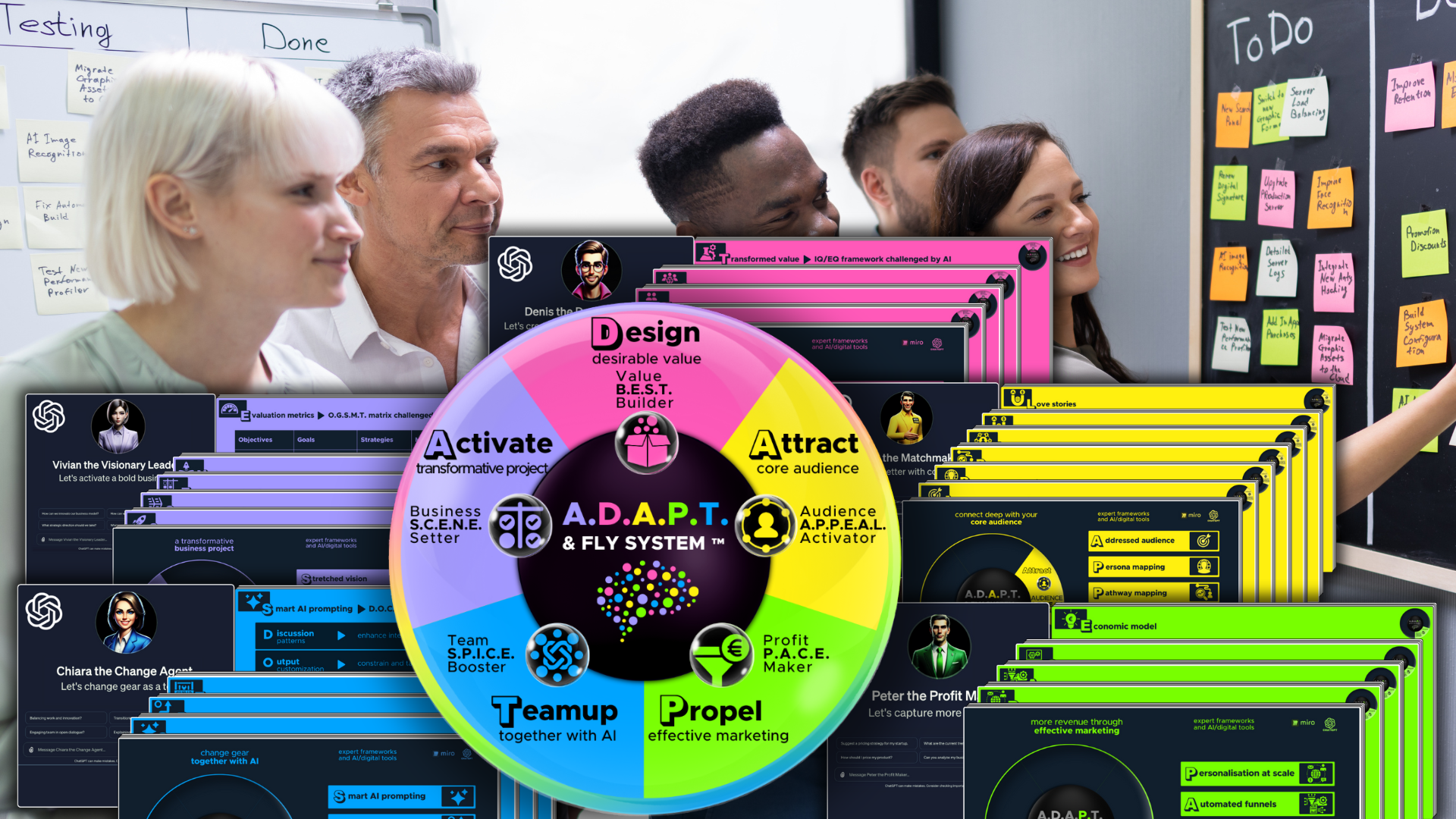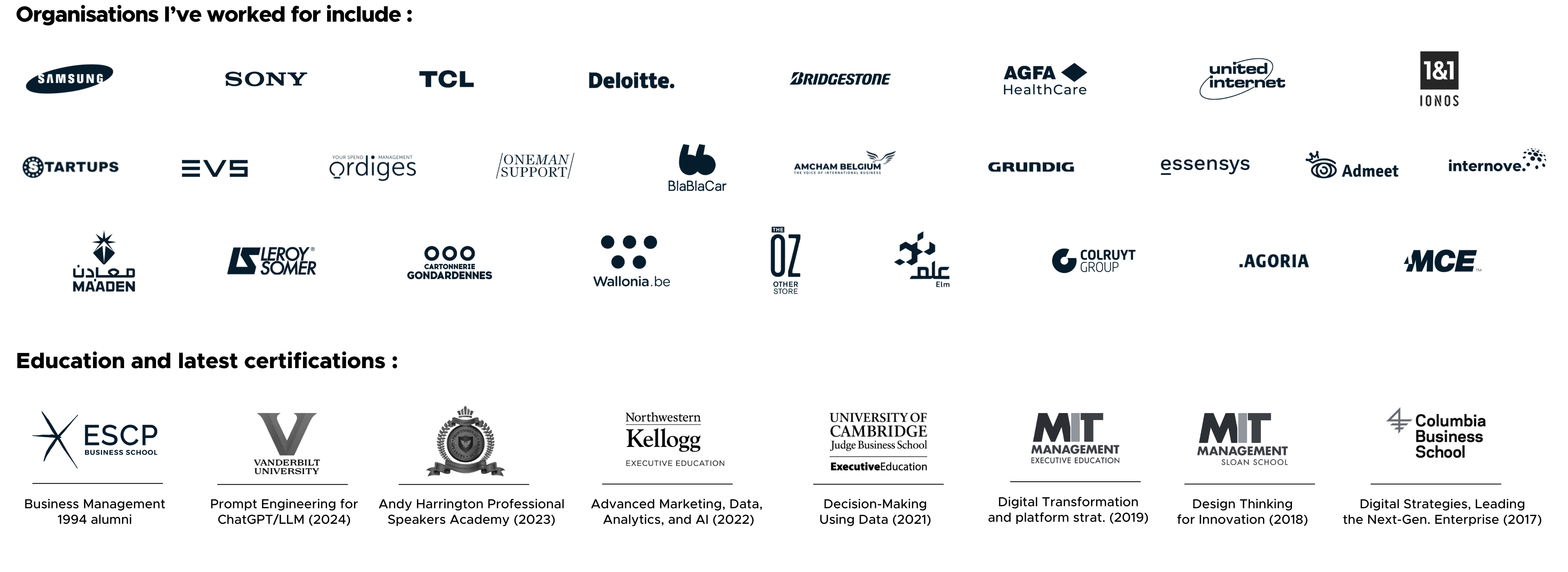HOW DO YOU ADAPT
Your Business Porfolio and Marketing
TO FLY IN A FAST WORLD OF DIGITAL AND AI?
I provide consulting and guidance to SMEs and large companies in Europe on a flexible basis. Additionally, I assist with the design and implementation of transformative projects. My expertise, methods, and tools are key in driving superior business results, and enhancing digital/AI and marketing skills. I work either in English, French, or German, both remotely and on-site, essentially from the Brussels, Paris, Cologne areas, and surrounding locations.
ADAPT & FLY
Business Services

INTERNATIONAL CONSULTING
Portfolio, Marketing, Transformation

LEADER/TEAM GUIDANCE
Workshops, Trainings, Coaching

TRANSFORMATIVE PROJECT
Design & Drive
I assist in the design and drive of international business transformation and marketing projects for agile execution, aimed at maximizing results while mitigating risks. My contributions draw on three decades of experience with companies such as Samsung, Sony, 1&1 Internet, Agfa, Bridgestone, and European tech SMEs, complemented by continuous education.
ABOUT
Frédéric Martin
A former executive from global leaders like Samsung, Sony, or 1&1 Internet AG, Frédéric brings extensive experience in international product, brand, marketing management, business strategy, and general management. He has led international teams in Germany and France, managing business lines and driving growth at a local and global scale. Transitioning to an independent consultant in 2012, he's offered expertise to many companies, focusing on business strategies, marketing, international development and transformation. An ESCP Business School alumni, Frédéric is committed to continuous education, he holds certifications from MIT, Cambridge, Columbia, and Kellogg Business School in digital business strategies, advanced marketing, and design thinking. To bring even more impact, Frédéric collaborates with like-minded consultants in Europe. Together, they uphold high standards of achievement, develop innovative strategies, co-lead inspiring workshops, live sessions, or transformative projects. The A.D.A.P.T. & FLY System ™ is a culmination of Frédéric's vast experience as an executive, consultant, coach, trainer.

DEDICATED TO YOUR SUCCESS
Examples of Works
CORPORATES
STARTUPS
Frédéric has worked as an advisor and interim manager, helping grow digital startups within big companies like Agfa HealthCare and Bridgestone (digital mobility), with a focus on European and US markets. He has also been mentoring owners of new businesses since 2012, helping them expand in Europe with a focus on business strategy and marketing plans. He has a special focus on Western Europe, with deep insights and extended networks in France, Germany, and the Benelux. He also helps with the adoption of more digital/AI applied to marketing and sales operations.
TECH SMES
CONSULTING
Since 2012, Frédéric has been an independent consultant, tackling marketing and business challenges for a diverse range of organisations, from small firms to large corporations. His expertise has benefited entities such as Agfa Healthcare, Bridgestone, and consultancies like Deloitte and One Man Support, as well as European SMEs, startups, and public sector organizations. Additionally, he has innovated various methods and tools focused on marketing and international business development. The A.D.A.P.T. & FLY System™ represents a comprehensive compilation of all the methods he's developed over the years.
WORKSHOPS
TRAININGS
LET'S DISCUSS
How I Could Benefit Your Business
When you look for support you often need to choose between global experience and domain expertise. I can offer you both.
But, as important, I can offer advanced methods & tools that can be adapted to your company.
➊ Broad Global Experience
➋ Deep Domain Expertise
BOOK TIME OR
Contact Me
UPCOMING EVENTS
See you there!
Let’s Meet @ Digital First, Brussels
Let’s Meet @ BPI France BIG, Paris
Let’s Meet @ IFA, Berlin
Let’s Meet @ Dmexco / DigitalX, Cologne
Let’s Meet @ Santexpo, Paris
Let’s Meet @ Viva Technology, Paris
Let’s Meet @ Hannover Messe
hannovermesse.de | fredericmartin.eu/#discuss
I’ll speak @ EDHEC Innovation Day, Paris
Let’s Meet @ Zukunftstag Mittelstand, Berlin
I’ll speak @ AI for Pitching, Online
Learn More
I’ll speak @ Game Changer Live, Online
join for free at www.adaptandfly.com/event1
ADAPT & FLY
Articles
INVITE ME AS A SPEAKER
Business in Times of Digital & AI
Frédéric is an international speaker trained by international top speaker Andy Harrington and his team (Elite Program). He delivers keynotes in English or French on topics that revolve around business adaptation, international marketing, digital strategies, and AI for business.

